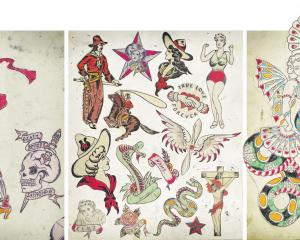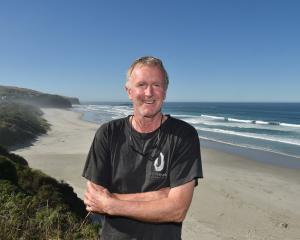
Midge Ure, the man responsible for Ultravox’s Vienna as well as Band Aid hit Do They Know It’s Christmas?, is still searching for the heart of the song, writes Shane Gilchrist.
Heavy on the synthesisers, a Brisbane hotel’s choice of hold music seems decidedly meta given it is Midge Ure who eventually picks up the phone.
Founder of various synth-heavy music groups, Ure is in "one of those cool, urban, chilled-out places, so I’d imagine it’d have something suitably contemporary," he chuckles in a brogue that reveals his Glasgow upbringing.
The Scottish singer, songwriter and producer responsible for the electro-pulse of Visage’s 1980 single Fade to Grey and Ultravox’s various hits, including Vienna (1981), plans to play a fair swag of tunes when he tours New Zealand this month, a visit that includes a concert at the Mayfair Theatre, Dunedin on Wednesday.
Ure has a fair range from which to select — more than 40 years, in fact — hence he’s called the tour "Something From Everything".
"The idea was to play something from every album I’ve released since 1978, from the Rich Kids, through to my last solo album (2015’s Fragile).
"But then I thought some of the audience might not know all the back catalogue and maybe it’s better to add the hits from here and there," he says, referring to other Ultravox singles, such as Reap The Wild Wind (1982) and Dancing With Tears In My Eyes (1984), as well as solo successes such as If I Was.
Ure will be accompanied by the India Electric Company, comprising multi-instrumentalists Cole Stacey and Joseph O’Keefe. He says the three-piece approach allows him to add colour, texture and depth to each song’s essential elements.
"I invited these guys to open for me a while back, because I like to give younger musicians exposure, and they are just exceptional. So they have ended up touring with me for the past 18 months.
"When you perform as a trio, it doesn’t mean you have to eliminate all the atmosphere of the recordings; they are just different textures. It’s about making sure the essence of the song remains powerful.
"I haven’t chosen anything that might be considered just a product of its time. I think I’ve chosen songs that still stand up, be they songs by Visage or Ultravox or whoever. It’s all about the songs."
That last point might seem obvious given the length of Ure’s career, yet it begs further exploration. Put another way, he is more interested in the heart of a song than the hype of the industry in which he has achieved much.
"If you look over my weird and wonderful history, I’ve never been one to stick with a particular genre of music. To me, music has always been about what’s good and bad, not what’s cool and uncool.
"I’ve played in rock bands, I’ve played acoustically, I’ve worked with the Chieftains, Kate Bush, Peter Gabriel ... all these people who I find interesting. And that’s the only criteria that matters.
"I don’t like to be categorised. And, in music, that’s almost an impossible thing to avoid. There is always someone trying to describe you to someone who doesn’t know you."
Ure first came to prominence in British boy band Slik, whose track Forever And Ever knocked Abba’s Mamma Mia off the top of the UK singles charts on Valentine’s Day 1976. Outgrowing Slik’s pop dimensions, he was then recruited by former Sex Pistols member Glen Matlock for his new outfit, the Rich Kids, who charted with a self-titled single in 1978. The following year, Ure was invited to become the new frontman in Ultravox, replacing John Foxx.
The band was a major influence on the new romantic and electro-pop movements of the early ’80s. Combining Ure’s guitar riffs with sweeping synthesiser motifs and enigmatic imagery, Ultravox enjoyed seven consecutive top 10 albums (in the UK) in six years. Then came November 25, 1984, when 36 artists (including Bono and Boy George) under the collective name Band Aid gathered at a West London studio to record Do They Know It’s Christmas?.
Ure wrote the song with Bob Geldof, who said that without Ure’s initial enthusiasm — not to mention his rapidly penned sketch for the single — Band Aid would have remained just an idea.
A project for Ethiopian famine relief, it sold 600,000 copies in its first week in the UK alone; within a few weeks the figure had risen to more than three million world-wide; within months, $NZ12 million had been raised.
The momentum spilled into Live Aid, the 1985 global duel concert (held in London and Philadelphia), which ultimately garnered more than $NZ250 million.
"You know, it was a project I didn’t forsee running for longer than six months," Ure says of Band Aid.
"Neither Bob nor I — or in fact any of the people who formed the Band Aid Trust to oversee the collection and distribution of money — could have foreseen the effects. It was a Christmas song that carried on and has been released and re-released for 32 years.
"I have seen the difference that charity events — and this includes comedy and sports — can make. Look at Comic Relief; it’s raised over a billion pounds. That’s unbelievable."
Despite his contribution, Ure is brutally honest about his experiences on the ground in Ethiopia.
Having arrived on a cargo plane in Addis Ababa, the Ethiopian capital, with the first emergency aid shipments bought with receipts from the Band Aid record, he was taken to a hotel where he saw people sitting around a swimming pool having lunch.
"Later, after a 30-minute drive in a Land Rover, I was in an aid camp which housed 6000 kids. Three kids had died that morning and that was a good day.
"I understood that my job was not there but back home doing what I did. I was useless in that situation ... the people out there doing those incredibly difficult jobs are unbelievably amazing."
There have been other significant sojourns, too.
Less well known is the fact Ure once played guitar for Thin Lizzy, performing on the same bill as Aerosmith and Santana.
A friend of the late Phil Lynott, Thin Lizzy’s bass player and vocalist, Ure was called in as a replacement for Gary Moore when the guitar whiz left the band during a 1979 American tour.
"I only learned recently that Phil had talked the other band members into letting me come out. He’d told them I knew all the songs. I didn’t," Ure laughs.
"I experienced that massive Americanised rock circus. We opened for Journey, did festivals with Santana and Aerosmith. In the meantime, I’d just joined Ultravox and was just putting the finishing touches to Visage, so I was straddling two worlds."
Despite having won Ivor Novello, Grammy and other awards, despite having made plenty of money for others, management issues meant he was broke by the mid-2000s, when he was also battling alcoholism (he is now sober). However, an investment in a recording studio in Bath, where he lives, means he has been able to write and produce his own material. His recent output, including 2015 solo album Fragile, might not earn him millions, yet the quest for a good song continues.
"When I started my musical apprenticeship I would play as much as you could to learn the craft. You’d start writing songs to emulate your favourite songwriters of the time.
"I can pin-point through my life various musical influences, from good old Gerry and the Pacemakers to The Beatles, through to David Bowie and Roxy Music, to Kraftwerk and Brian Eno ... it goes on and on, and you become a mix of all those things," Ure says.
"There is no school for songwriting — OK, sure, there are places that claim to be — but you can’t be taught. You have to start by writing really crap ones and hopefully get better at it.
"If you were lucky enough, you were signed and got to go into a recording studio that cost so many thousands of dollars a day. If you were even luckier, your record did quite well and all of a sudden you were able to go off and do tours.
"Now, the recording process has changed completely. You can make an album on a laptop if you have the knowledge.
"I have always been interested in using whatever to make a piece of music work. That doesn’t mean everything has to be electronic. I like using guitars, too.
"I don’t understand musicians who say they are only in a synth band so they aren’t going to use guitars, or vice versa.
"It’s a bit like telling a painter you can only use red and blue."
Midge Ure plays the Mayfair Theatre, Dunedin, on March 22












